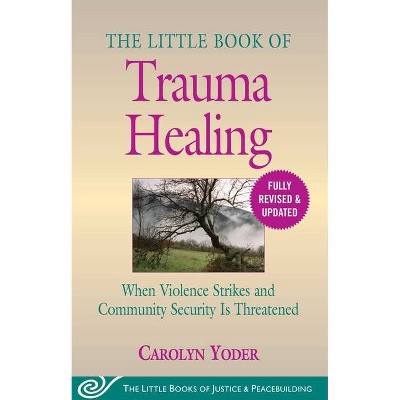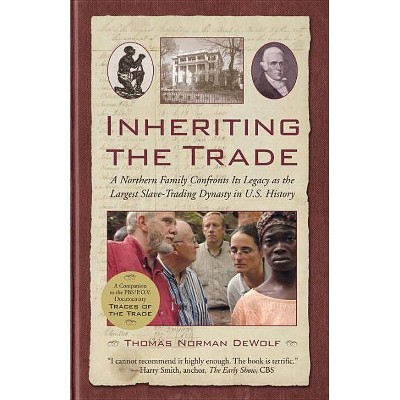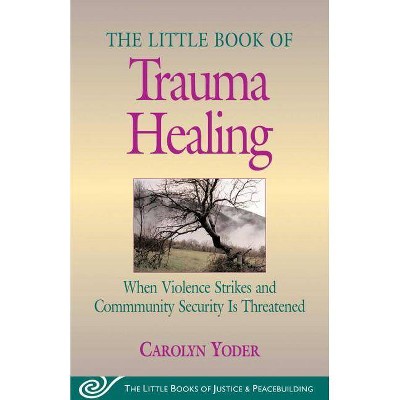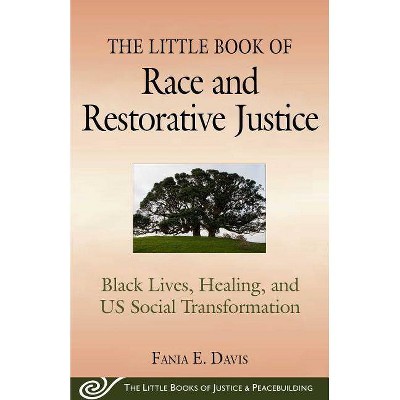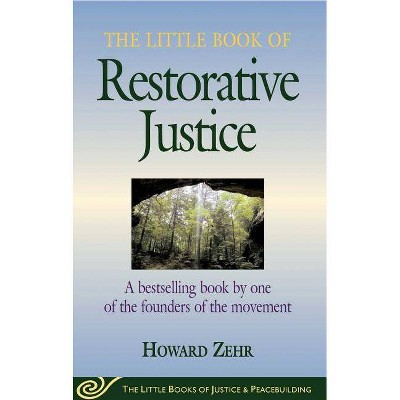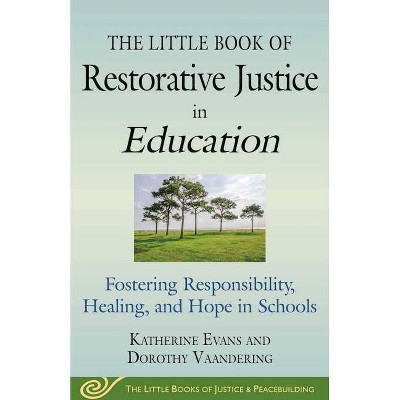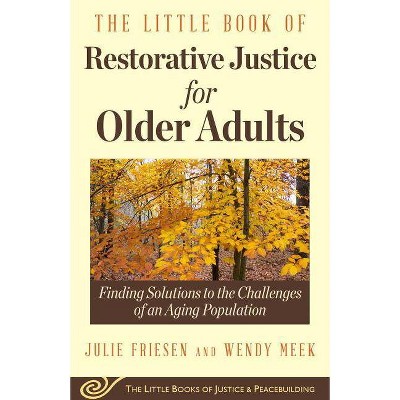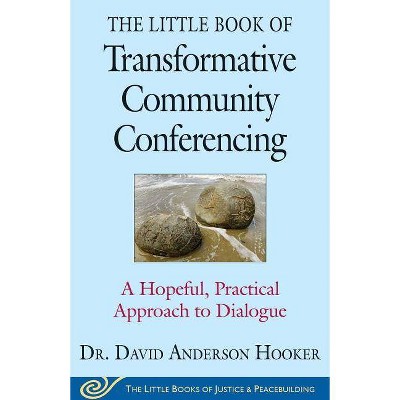The Little Book of Racial Healing - (Justice and Peacebuilding) by Thomas Norman Dewolf & Jodie Geddes (Paperback)
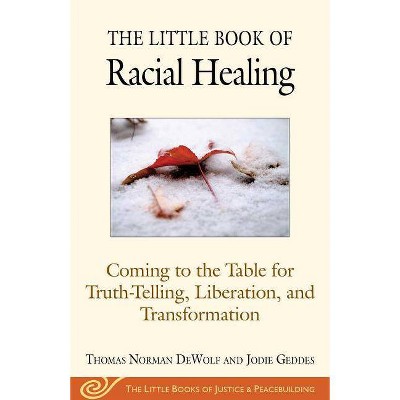
Similar Products
Products of same category from the store
AllProduct info
<p/><br></br><p><b> About the Book </b></p></br></br>"The Little Book of Racial Healing shares Coming to the Table's vision for the United States: a vision of a just and truthful society that acknowledges and seeks to heal from the racial wounds of the past. Readers will learn practical skills for better listening; discover tips for building authentic, accountable relationships; and will find specific and varied ideas for taking action"--<p/><br></br><p><b> Book Synopsis </b></p></br></br><b>This book introduces Coming to the Table's approach to a continuously evolving set of purposeful theories, ideas, experiments, guidelines, and intentions, all dedicated to facilitating racial healing and transformation.</b> <p/>People of color, relative to white people, fall on the negative side of virtually all measurable social indicators. The "living wound" is seen in the significant disparities in average household wealth, unemployment and poverty rates, infant mortality rates, access to healthcare and life expectancy, education, housing, and treatment within, and by, the criminal justice system. <p/>Coming to the Table (CTTT) was born in 2006 when two dozen descendants from both sides of the system of enslavement gathered together at Eastern Mennonite University (EMU), in collaboration with the Center for Justice & Peacebuilding (CJP). Stories were shared and friendships began. The participants began to envision a more connected and truthful world that would address the unresolved and persistent effects of the historic institution of slavery. This Little Book shares Coming to the Table's vision for the United States--a vision of a just and truthful society that acknowledges and seeks to heal from the racial wounds of the past. Readers will learn practical skills for better listening; discover tips for building authentic, accountable relationships; and will find specific and varied ideas for taking action. The table of contents includes: <br><ul><li>Chapter 1: Introduction</li><li>Chapter 2: Trauma Awareness and Resilience</li><li>Chapter 3: Restorative Justice</li><li>Chapter 4: Uncovering History</li><li>Chapter 5: Making Connections</li><li>Chapter 6: Circles, Touchstones, and Values</li><li>Chapter 7: Working Toward Healing</li><li>Chapter 8: Taking Action</li><li>Chapter 9: Liberation and Transformation</li></ul><br>And subject include Unresolved Trauma, Brown v. Board of Education, Lynching, Connecting with Your Own Story, Wht Healing Looks Like, Engage Your Community, and much more.<p/><br></br><p><b> Review Quotes </b></p></br></br><br>"Drawing upon history, lived experience, and the conceptual frameworks of trauma healing and restorative justice, the authors provide concrete suggestions for how individuals and groups can undertake this healing journey. What a timely, much needed and practical book!" <b>--Howard Zehr, author of <i>The Little Book of Restorative Justice </i>and <i>Changing Lenses: A New Focus for Crime and Justice</i>; Director Emeritus, Zehr Institute for Restorative Justice</b> <p/> "Unhealed historical harms embedded in the founding of this nation continue to splinter communities across the United States. Tackling a big topic in a little book, Jodie Geddes and Tom DeWolf offer no easy answers on the difficult topic of racism. But they create a pathway for healing justice that is rooted in the decade-long experience of Coming to the Table--uncovering history (truth-telling), making connections across racial lines, working together to heal, and taking action for justice that restores. For a deeply divided nation, <i>The Little Book of Racial Healing </i>offers a timely and hopeful framework for conversation and action." <b>--J. Daryl Byler, Executive Director, Center for Justice and Peacebuilding</b> <p/> "This rare jewel of practical wisdom shows us how to embody racial healing in truth and kinship. It reads with such ease and affinity that you will want to treasure it and share it with everyone you know." <b>--Ruth King, author of <i>Mindful of Race: Transforming Racism from the Inside Out</i></b> <p/> "That the authors have created clarity and coherency about so diffuse yet tangled a subject is amazing--and to do that in a Little Book is doubly amazing! This book speaks truth without condemning, offers hope without denying reality, and honors the core dignity in everyone. They have lived in their writing the path they describe." <b>--Kay Pranis, author of <i>The Little Book of Circle Processes</i> and co-author of <i>Peacemaking Circles: From Crime to Community</i></b> <p/> "The contents of this little book are big, very big indeed. At this current political moment, we by necessity must struggle. That struggle is often organic. Jodie Geddes's and Tom DeWolf's well researched and practiced approach to racial healing asks us to stop and do more than reflect. Their book compels us to, in the words of Alice Walker, start "Healing . . . where the wound was made." . . . The truth-telling that emerges from these pages brings into view a kind of praxis grounded in decolonial love. Given that restorative justice practitioners often leave out racial justice and racial justice activists often miss the healing parts of the work, this book brings the two together and acknowledges that one cannot exist without the other--meaning, without a racial justice lens, you are not doing restorative justice. In short, liberation requires healing--in particular, racial healing that makes it possible for us to continue the struggle and make steps toward reconciliation." <b>--Dr. David Ragland, co-founder of the Truth-Telling Project of Ferguson and Senior Bayard Fellow at the Fellowship of Reconciliation</b><br><p/><br></br><p><b> About the Author </b></p></br></br><b>Thomas Norman DeWolf</b> serves as Executive Director for Coming to the Table and is the author of <i>Inheriting the Trade: A Northern Family Confronts Its Legacy as the Largest Slave-Trading Dynasty in U.S. History</i>, the story of his experiences participating in the making of the Emmy-nominated documentary <i>Traces of the Trade</i>, in which he is featured. Tom is co-author of <i>Gather at the Table</i>, winner of the Phillis Wheatley Award for Best Nonfiction. The African American Jazz Caucus awarded him the 2012 Spirit of Freedom Award for Social Justice. Tom is a certified STAR Practitioner (Strategies for Trauma Awareness & Resilience). He lives in Oregon. <p/><b>Jodie Geddes</b> is a Jamaican native who grew up in Brooklyn. She is the community organizing coordinator at Restorative Justice for Oakland Youth (RJOY) and leads their Truth-Telling, Racial Healing and Reparations Project. She is a trainer and facilitator of restorative processes in schools, justice systems, and communities. She earned an MA in conflict transformation from Eastern Mennonite University and is president of the board of managers for Coming to the Table. She lives in California.
Price History
Cheapest price in the interval: 5.99 on October 28, 2021
Most expensive price in the interval: 5.99 on December 17, 2021
Price Archive shows prices from various stores, lets you see history and find the cheapest. There is no actual sale on the website. For all support, inquiry and suggestion messages communication@pricearchive.us

